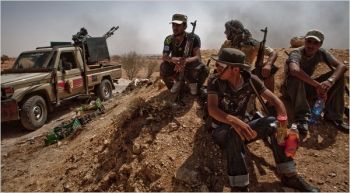
Publisher:
Bonnie King
CONTACT:
Newsroom@Salem-news.com
Advertising:
Adsales@Salem-news.com

~Truth~
~Justice~
~Peace~
TJP
Jul-12-2011 13:34

 TweetFollow @OregonNews
TweetFollow @OregonNews
Libya and US Debt: Another Treasury-Draining War
By Ralph E. Stone Salem-News.comClearly the reason now for the NATO-led Libya mission is a regime change of vital civil interest to the U.S., and if not, why is the U.S. participating, especially when are economy is faltering?
 Libyan rebels rested Wednesday after seizing Qawalish, a village in western Libya. (NY Times) |
(SAN FRANCISCO) - The United States national debt exceeds $14.2 trillion and climbing. About 14 million Americans are unemployed. Public health, education, social services, and police and fire departments are facing cutbacks. Yet, the bill for U.S. participation in the NATO-led Libya mission is projected to reach at least $844 million by September with the U.S. funding about three quarters of the military spending by all NATO countries. This expenditure is on top of $1.2 trillion and counting, we are spending on the Iraq and Afghanistan wars.
Clearly, we cannot continue these enormous war expenditures ad infinitum, especially with our faltering economy. This money could be better spent elsewhere.
Here are some of the important events in the NATO-led Libya mission.
* On February 16, 2011, Libyan police clashed with thousands of anti-government protestors in the coastal city of Benghazi, calling the demonstration "a day of rage." These protestors joined a smaller demonstration in support of arrested human rights activist and lawyer Fathi Tarbel, who represents the families of over 1,000 prisoners massacred at Tripoli's Abu Salim prison in 1996. (Tarbel was subsequently released.) Benghazi is a hot bed of anti-government sentiment. There were also demonstrations in Baida, Misurata, and Zentan, as well as pro-Gaddafi demonstrations in Benghazi, Tripoli and elsewhere. Reportedly, as many as 200 anti-government protestors killed. Regime opponents called for a nationwide strike.
Gaddafi tried to allay unrest by proposing the doubling of government employees' salaries and releasing 110 Islamic militants who oppose him. In addition, Gaddafi had lately met groups of students, journalists, lawyers and others to hear their complaints. This was not enough for protestors. The demonstrations escalated and Gaddafi’s response was swift and brutal.
The Libyan grievances are similar to those in Tunisia and Egypt: high youth unemployment and the harsh suppression of all political activity under an autocratic rule which has lasted decades in this oil rich country of 6.5 million.
On March 17, 2011, the UN Security Council resolution 1703 <www.un.org/News/Press/docs/
On February 26, 2011, The UN Security Council referred the Libyan situation to the International Criminal Court (ICC). The ICC is a treaty-based court governed by the Rome Stature <http://untreaty.un.org/cod/
On June 27, The ICC issued arrest warrants for Gaddafi, his son Saif al-Islam, and his spy chief, citing evidence of crimes against humanity committed against political opponents. The African Union refused to recognize the arrest warrant issued for Gaddafi as they believe it will “seriously impede” all efforts aimed at a peace settlement to the Libyan conflict. The African Union may be right as Aisha Gaddafi, the Libyan leader's daughter, disclosed that there had been direct and indirect negotiations with rebels before the ICC action.
* Article 1, Section 8 of the U.S. Constitution states that only Congress has the power "to declare war."
* The War Powers Resolution of 1973 (50 U.S.C. 1541-1548) is a federal law intended to check the power of the President in committing the U.S. to an armed conflict without the consent of Congress. The Resolution requires the President to notify Congress within 48 hours of committing armed forces to military action and forbids armed forces from remaining for more than 60 days, with a further 30 day withdrawal period, without an authorization of the use of military force or a declaration of war.
Section 1542 of the War Powers Resolution states: ”The President in every possible instance shall consult with Congress before introducing United States Armed Forces into hostilities or into situations where imminent involvement in hostilities is clearly indicated by the circumstances, and after every such introduction shall consult regularly with the Congress until United States Armed Forces are no longer engaged in hostilities or have been removed from such situations.”
* The key word in Section 1542 is "hostilities." President Obama argued that the U.S. is just enforcing the UN Security Council mandate to protect the Libyan people from Muammar Gaddafi's forces. He further argued that the NATO-led mission is not the kind of "hostilities" envisioned by the War Powers Resolution.
Reportedly, Obama overruled Jeh C. Johnson, the Pentagon general counsel, and Caroline D. Krass, the acting head of the Justice Department’s Office of Legal Counsel, who had told the White House that they believed that the U.S. military’s activities in the NATO-led air war amounted to “hostilities.”
* House Speaker John Boehner said Obama's justifications for the Libyan mission doesn't meet the "straight-face test." Or in legalese, it didn't pass the laugh test.
* Remember back in December 2007, the Boston Globe asked 12 presidential candidates about military action aimed at stopping Iran from building nuclear weapons. “In what circumstances, if any,” the Globe asked, “would the president have constitutional authority to bomb Iran without seeking a use-of-force authorization from Congress?” Barack Obama responded: “The president does not have power under the Constitution to unilaterally authorize a military attack in a situation that does not involve stopping an actual or imminent threat to the nation.”
Interestingly enough then Secretary of Defense Robert Gates remarked that Libya's civil conflict was not a vital interest to the U.S.
* On July 7, the U.S. House of Representatives voted not to bar funds for U.S. involvement in the NATO-led Libya mission, but did vote to bar military aid to Libyan rebels. President Obama has authorized $25 million in nonlethal assistance to the rebels, including ready-to-eat meals. And the U.S. has supplied $53 million in humanitarian aid to the rebels. Neither is effected by the legislation. The House rejected a measure that would have prohibited funds for the U.S. military to continue its limited role.
* The U.S Senate has postponed voting on a resolution sponsored by Senators John Kerry and John McCain that would authorize military action in Libya for up to a year. The resolution specifies that no U.S. ground forces will be deployed, and that the U.S. will not bear reconstruction costs in a post-Moammar Gadhafi Libya. The resolution need 60 votes to pass, but seems to have broad support.
* Democratic Congressman Dennis Kucinich and nine other members of Congress have filed a lawsuit seeking to stop U.S. involvement in the NATO-led Libya campaign. If the court follows precedent, the lawsuit will likely be dismissed because individual Congressmen do not have standing to sue the President when the Congress as a whole has not acted. The exercise of war powers is a political question for the President and Congress, not the courts. And here, the House has acted to fund the Libya campaign and the Senate is likely to follow suit.
* Most military experts agree that air power alone rarely, if ever, wins a conflict. The combined use of air power and ground forces--whose potency has been multiplied by precision weapons--remains the most effective way for a country to win major wars. Before the Libya conflict, NATO was probably counting on the Libyan rebels to be the ground forces. But the rebels are untrained and outgunned by Gaddafi's military. In this regard, in June, the France announced that it was providing direct military aid to Libyan rebels including guns and rocket-propelled grenades, in the Nafusa Mountains in western Libya . Britain said it is providing body armor, police uniforms and communications equipment. These actions provoked rcitics who have already claim that NATO is overstepping the boundaries of the U.N. Security Council mandate that authorized the intervention. What next, NATO military advisors on the ground to assist the rebels as we did in Vietnam?
Clearly the reason now for the NATO-led Libya mission, if it was not implicit in the UN Security Council mandate 1973, is a regime change, that is a regime without Guadaffi. But is a regime change of vital civil interest to the U.S., and if not, why is the U.S. participating, especially when are economy is faltering?
 Salem-News.com writer Ralph E. Stone was born in Massachusetts. He is a graduate of both Middlebury College and Suffolk Law School. We are very fortunate to have this writer's talents in this troubling world; Ralph has an eye for detail that others miss. As is the case with many Salem-News.com writers, Ralph is an American Veteran who served in war. Ralph served his nation after college as a U.S. Army officer during the Vietnam war. After Vietnam, he went on to have a career with the Federal Trade Commission as an Attorney specializing in Consumer and Antitrust Law. Over the years, Ralph has traveled extensively with his wife Judi, taking in data from all over the world, which today adds to his collective knowledge about extremely important subjects like the economy and taxation. You can send Ralph an email at this address stonere@earthlink.net
Salem-News.com writer Ralph E. Stone was born in Massachusetts. He is a graduate of both Middlebury College and Suffolk Law School. We are very fortunate to have this writer's talents in this troubling world; Ralph has an eye for detail that others miss. As is the case with many Salem-News.com writers, Ralph is an American Veteran who served in war. Ralph served his nation after college as a U.S. Army officer during the Vietnam war. After Vietnam, he went on to have a career with the Federal Trade Commission as an Attorney specializing in Consumer and Antitrust Law. Over the years, Ralph has traveled extensively with his wife Judi, taking in data from all over the world, which today adds to his collective knowledge about extremely important subjects like the economy and taxation. You can send Ralph an email at this address stonere@earthlink.net
 |
 |
Articles for July 11, 2011 | Articles for July 12, 2011 | Articles for July 13, 2011


Quick Links
DINING
Willamette UniversityGoudy Commons Cafe
Dine on the Queen
Willamette Queen Sternwheeler
MUST SEE SALEM
Oregon Capitol ToursCapitol History Gateway
Willamette River Ride
Willamette Queen Sternwheeler
Historic Home Tours:
Deepwood Museum
The Bush House
Gaiety Hollow Garden
AUCTIONS - APPRAISALS
Auction Masters & AppraisalsCONSTRUCTION SERVICES
Roofing and ContractingSheridan, Ore.
ONLINE SHOPPING
Special Occasion DressesAdvertise with Salem-News
Contact:AdSales@Salem-News.com


googlec507860f6901db00.html
Terms of Service | Privacy Policy

All comments and messages are approved by people and self promotional links or unacceptable comments are denied.
COLLI July 13, 2011 4:54 pm (Pacific time)
President Obama differs very little from most other politicians, regardless of which side og the political aisle they hail from. If you remove the lies and hot air, you would find an empty suit sitting atop a pair of shoes. The difference is that this empty suit is supposed to be leading our country and is surrounded by teleprompters. He may have set a record at losing site of campaign promises. The question is "Who (if anyone) is on the horizon, that will do a better job?" One more election where we all get to vote for the lesser of two evils folks!
[Return to Top]©2025 Salem-News.com. All opinions expressed in this article are those of the author and do not necessarily reflect those of Salem-News.com.